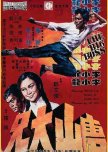They Didn't Come Home for Dinner!
Bruce Lee made a big splash in Hong Kong with The Big Boss. Set in the contemporary time, bloody, more realistic, and of course centered around Bruce Lee, it was something bold and new.
The story had plot holes and was weak despite a good idea. Ice dealers were also drug dealers which put the honorable men working at the ice house and unknowingly for the syndicate in danger. They found out soon enough, as one or two at a time were called into the boss' office and disappeared. These guys were not the sharpest knives in the drawer when it came to figuring out the danger lurking behind the big boss' gated mansion complete with guard dogs and endless armed minions. The only clue friends and family had that something untoward might have happened was that they didn't come home for dinner.
Most of the fights were brawls rather than martial arts conflicts. Cheng Chiu On (Bruce Lee) had taken a vow to not fight, why we don't know, and watched most of the action until the halfway mark in the movie. When the bodies started stacking up he finally decided to enter the fray, though for many it was too little too late. Most of the extras were slow and lumbering compared to Bruce when he took center stage and showed everyone how it was done. There is no overestimating the skill, quickness, and precision he displayed. Han Ying Chieh, the Big Bad, who also choreographed the fights was at least an able opponent in the final conflict.
The fights were brutal and bloody. It was one of the few times I've seen Bruce fight with weapons, aside from nunchaku, as he did in this one. Oddly, director and writer Lo Wei, inserted weirdly comedic moments in scenes at least somewhat grounded in realism. Wuxia flying guard dogs are not to be missed! There was also more wire work than I would have expected, completely unnecessary when dealing with a fighter the caliber of Bruce Lee.
James Tien also gave a notable performance early on as Cheng's friend, Hsu Chien, who tried to stand up for the workers. He had a light and spark that was entertaining to watch. For the most part, the rest of the acting was typical of old kung fu movies, stilted and weak.
Like many kung fu movies, the story was imperfect. The early fight scenes were also flawed. Once the real Big Boss stepped up, the movie became worthwhile for me. Bruce Lee had a grace, magnetism, beauty, and fluidity that I've never seen matched. It was worth sitting through the more stagnant parts of the movie to be able to watch him work.
The story had plot holes and was weak despite a good idea. Ice dealers were also drug dealers which put the honorable men working at the ice house and unknowingly for the syndicate in danger. They found out soon enough, as one or two at a time were called into the boss' office and disappeared. These guys were not the sharpest knives in the drawer when it came to figuring out the danger lurking behind the big boss' gated mansion complete with guard dogs and endless armed minions. The only clue friends and family had that something untoward might have happened was that they didn't come home for dinner.
Most of the fights were brawls rather than martial arts conflicts. Cheng Chiu On (Bruce Lee) had taken a vow to not fight, why we don't know, and watched most of the action until the halfway mark in the movie. When the bodies started stacking up he finally decided to enter the fray, though for many it was too little too late. Most of the extras were slow and lumbering compared to Bruce when he took center stage and showed everyone how it was done. There is no overestimating the skill, quickness, and precision he displayed. Han Ying Chieh, the Big Bad, who also choreographed the fights was at least an able opponent in the final conflict.
The fights were brutal and bloody. It was one of the few times I've seen Bruce fight with weapons, aside from nunchaku, as he did in this one. Oddly, director and writer Lo Wei, inserted weirdly comedic moments in scenes at least somewhat grounded in realism. Wuxia flying guard dogs are not to be missed! There was also more wire work than I would have expected, completely unnecessary when dealing with a fighter the caliber of Bruce Lee.
James Tien also gave a notable performance early on as Cheng's friend, Hsu Chien, who tried to stand up for the workers. He had a light and spark that was entertaining to watch. For the most part, the rest of the acting was typical of old kung fu movies, stilted and weak.
Like many kung fu movies, the story was imperfect. The early fight scenes were also flawed. Once the real Big Boss stepped up, the movie became worthwhile for me. Bruce Lee had a grace, magnetism, beauty, and fluidity that I've never seen matched. It was worth sitting through the more stagnant parts of the movie to be able to watch him work.
Questa recensione ti è stata utile?

 54
54 191
191 11
11























